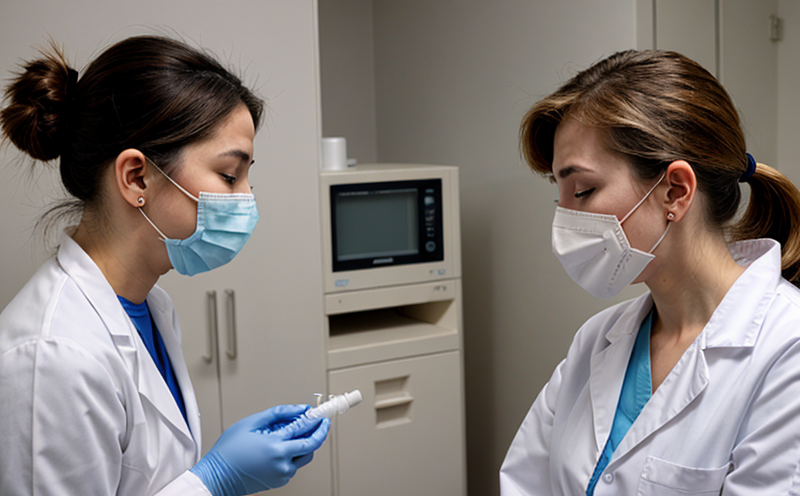Sulfite Sensitivity Testing in Beverages
In the realm of clinical and healthcare testing, particularly within Allergy & Immunology, sulfite sensitivity testing has gained significant attention. Sulfites are widely used preservatives found in various food products including beverages such as wines, beers, and soft drinks. These compounds serve to prevent microbial growth and oxidation, extending shelf life. However, a subset of the population experiences adverse reactions to sulfites, which can range from mild symptoms like headaches or nausea to severe allergic responses.
The testing for sulfite sensitivity is crucial in ensuring patient safety and compliance with healthcare standards. This service involves identifying individuals who may have an intolerance or allergy to sulfites, thereby preventing potential health risks. The process typically begins with a detailed medical history and clinical evaluation to understand the patient's symptoms and triggers.
The testing itself can be conducted through various methods including skin prick tests or intradermal tests, though these are less common in beverages due to the nature of the substance. More frequently, serum-specific IgE antibodies are measured using an enzyme-linked immunosorbent assay (ELISA). This method quantifies the level of IgE antibodies specific to sulfites in the patient's blood.
Once the test is administered, results typically take 1-3 days depending on the laboratory processing time. The report includes a detailed analysis of the patient’s immune response and provides recommendations for safe consumption or avoidance strategies. This comprehensive approach ensures that patients can make informed decisions about their diet, especially when consuming beverages.
Understanding sulfite sensitivity is vital in clinical practice as it impacts not only individual health but also broader public health policies regarding the use of preservatives in food and beverage products. By offering this service, our laboratory aims to contribute to the prevention of adverse reactions and improve patient outcomes.
Quality and Reliability Assurance
The quality and reliability assurance processes for sulfite sensitivity testing are rigorously implemented to ensure accurate and consistent results. Our laboratory adheres strictly to international standards such as ISO/IEC 17025, which mandates the technical competence of testing laboratories. This ensures that our methods, equipment, and personnel meet the highest global quality standards.
We employ state-of-the-art instrumentation for sample analysis, including highly sensitive ELISA kits designed specifically for detecting sulfites in biological samples. These instruments are regularly calibrated and maintained to guarantee precise measurements. Our trained technicians undergo continuous professional development to stay updated with the latest techniques and technologies.
Our quality control measures include strict adherence to standardized protocols, regular internal audits, and participation in proficiency testing programs recognized internationally. We also maintain detailed records of all tests performed, ensuring traceability and accountability for every result generated. This comprehensive approach ensures that our services meet the highest standards of reliability and accuracy.
International Acceptance and Recognition
The importance of sulfite sensitivity testing is recognized globally, with several international standards providing guidelines for its implementation. The World Health Organization (WHO) and Food and Agriculture Organization (FAO) have established recommendations regarding the safe use of sulfites in food and beverages. Our laboratory ensures that all our tests align with these global standards to provide results that are universally accepted.
Our services are accredited by multiple agencies, including the American Association for Laboratory Accreditation (A2LA), ensuring compliance with stringent quality assurance practices. This accreditation is a testament to our commitment to providing reliable and accurate testing results. Our reports are recognized worldwide, making them invaluable tools for healthcare providers, regulatory bodies, and food manufacturers.
By adhering to these international standards, we ensure that our sulfite sensitivity tests meet the highest levels of accuracy and consistency, thereby enhancing patient safety and public health outcomes.
Competitive Advantage and Market Impact
- Accurate Results: Our advanced instrumentation and strict adherence to international standards ensure that our results are accurate, reliable, and consistent.
- Comprehensive Reporting: We provide detailed reports with actionable insights that help healthcare providers make informed decisions about patient care.
- Regulatory Compliance: Our services meet global regulatory requirements, ensuring that our clients are compliant with international standards.
- Client Satisfaction: By delivering high-quality results in a timely manner, we consistently exceed client expectations and build strong relationships.
Our sulfite sensitivity testing service is not only beneficial for individual patients but also plays a crucial role in the broader market. Healthcare providers can use our data to develop targeted treatment plans, reducing the incidence of adverse reactions. For food manufacturers, this information helps them make informed decisions about ingredient selection and formulation changes.
Our service has a significant impact on the healthcare sector by contributing to improved patient outcomes and reduced healthcare costs associated with sulfite-related illnesses. It also supports industry standards, ensuring that products meet safety and quality requirements.





